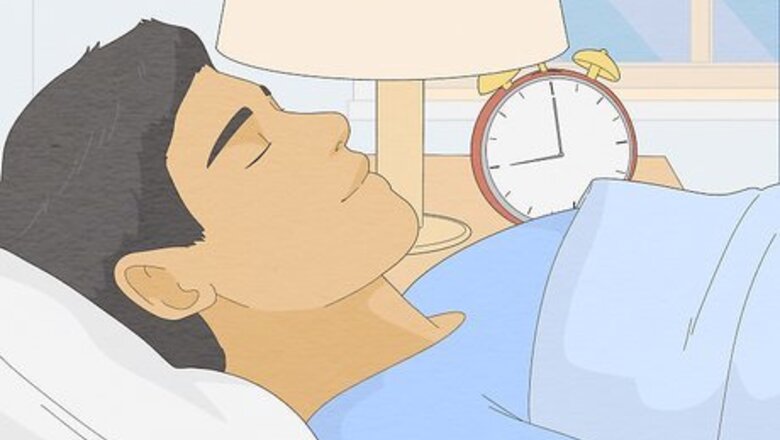
views
Sleep 7-8 hours a night.
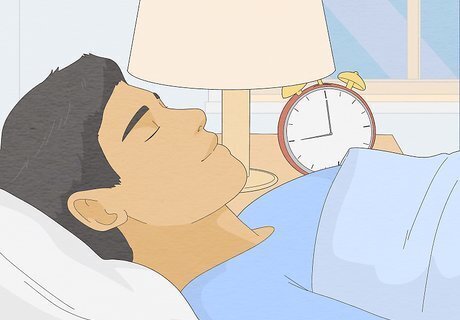
Sleep deprivation is a major cause of low energy levels. Pick a bedtime that allows you to get at least 7 hours of sleep. Go to bed at the same time every night and get up at the same time every morning to create a healthy sleep routine that makes you feel more energized during the day. Sleep in a cool room, such as a room with the air conditioning turned on, if possible. Cool environments help the body get better sleep. That's because cool temperatures help bring on the drop in core temperature that signals sleepiness. Avoid napping during the day so you’re more tired at night.
Open your curtains or blinds.

Natural light makes you feel more awake. Whether you’re at work or at home, let in as much natural light as possible to help boost your energy levels. If you can, move your desk closer to a window or into a different room where there are more windows and light. Artificial light can also make you feel more energetic at night when there’s no natural light. Try using fluorescent light bulbs labeled something like “cool white” or “daylight,” which emit a white light that’s more similar to natural light than standard yellow light bulbs.
Try a simple deep breathing exercise.
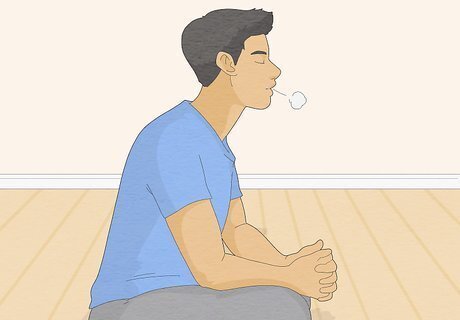
This sends more oxygen to your brain and body. Slowly breathe in through your nose for a count of 4 seconds. Hold your breath for a count of 7 seconds, then exhale slowly through your mouth for a count of 8 seconds. Repeat this 4 times. You can do this simple breathing exercise twice a day to improve your energy levels. This is also a good exercise to do whenever you’re feeling stressed.
Eat a carb-rich breakfast.
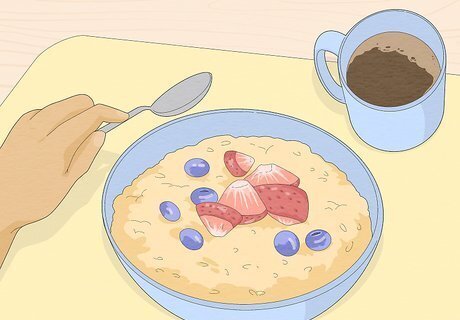
Breakfast gets your metabolism going and provides energy to burn. Don’t skip a morning meal or you won’t get the valuable energy you need to start your day! Eat breakfasts that include healthy carbs like cereals and whole-grain breads. A bowl of oatmeal with some healthy toppings like fruits, berries, or nuts is a great energy-boosting breakfast. Lean proteins like eggs and yogurt are another good choice for breakfast. If you prefer drinking your breakfast, try blending fruit, juice, yogurt, and other healthy ingredients together for a delicious and nutritious breakfast smoothie.
Drink caffeine early in the day.
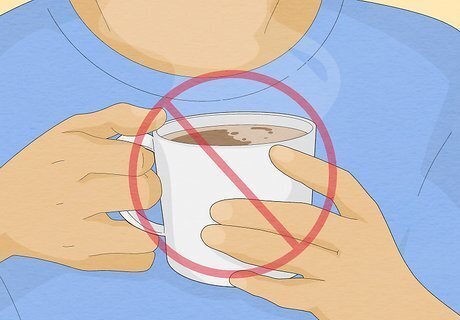
Too much caffeine can make you more tired. A cup of coffee can certainly make you feel more alert in the morning, but try to avoid having caffeine after about 2 p.m. Drinking coffee or other caffeinated beverages late in the day can mess up your sleep, leading to more fatigue the next day. Too much caffeine can make you crash later on and feel less energetic. If you feel tired all the time and you consume caffeine regularly, try cutting it out all together. Gradually stop having all caffeinated drinks over a 3-week period, then stay off it for 1 month and see if you feel like you have more energy.
Have small meals every 3 to 4 hours.
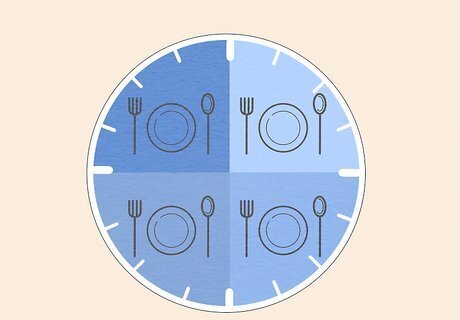
Eating smaller meals more frequently keeps you energized all day long. Do this instead of only eating a few large meals. Bring portable snacks with you to work or school so you always have something ready to give you a little energy boost. Eat the same amount of food every 3 to 4 hours or go for healthful snacks in between smaller meals.
Include healthy foods from all food groups in meals.
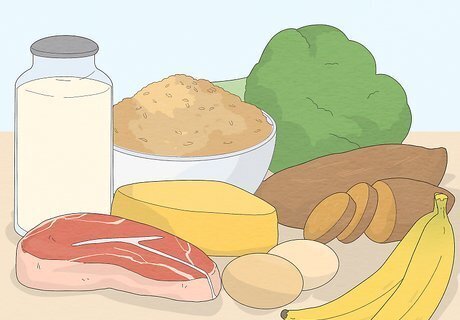
This provides your body with all the nutrients it needs to get energy. Eat whole foods, especially fruits and vegetables, lean proteins, low-fat dairy, and whole grains. Reduce the amount of high-fat, high-sugar, and high-salt foods you eat, which aren’t very nutritious and can cause your energy levels to crash. Examples of energizing, healthful snacks include nuts, olives, yogurt, fresh fruit, and legumes. Leafy greens, broccoli, and orange vegetables like carrots and sweet potatoes are great nutrient-dense vegetables to include in your meals. Fish and legumes are good options for healthy proteins. Aim to eat 3 oz (85 g) of whole-grain cereals, pasta, rice, or bread every day.
Alternate between sitting and standing.
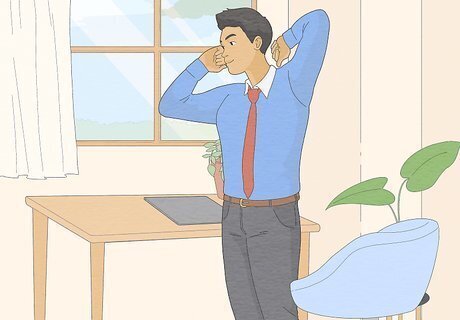
Prolonged periods of sitting reduce your energy. Stand up and move around every 30 minutes to get your blood flowing and refresh your energy levels. Reduce sitting-based activities like watching TV and using a computer. If you sit at a desk at work, take 2- to 5-minute active breaks every hour. An active break could be a walk around the office, some stretching in the hallway, or going to get some coffee in the lunchroom. If you work on a computer at home or at an office, consider getting a standing desk or an adjustable desk. Alternate between sitting and standing throughout the day.
Take a multivitamin with your lunch.
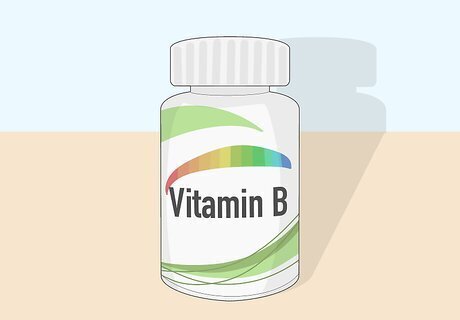
This gives you additional energy-boosting nutrients. Choose a multivitamin that has B vitamins like vitamin B12. Magnesium and iron are other good ingredients to look for that help supplement your energy levels. Note that a multivitamin is not a replacement for a healthy, balanced meal.
Drink lots of water.
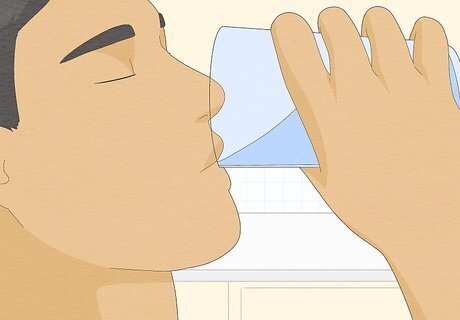
Being even a little dehydrated can make you feel fatigued. Drink water throughout the day to stay hydrated, especially before, during, and after physical activity. Keep a glass of water at your desk or carry a bottle of water with you when you’re on the go. Doctors and scientists alike believe that drinking water is a key component to being healthier and feeling more energized during the day, although there is some disagreement about exactly how much is needed. The U.S. National Academies of Sciences, Engineering, and Medicine says that women should drink 11.5 cups (2.7 L) and men should drink 15.5 cups (3.7 L) of water per day. The Institute of Health says that children and teens should drink 7.2 (1.7 L) to 13.9 (3.3 L) of water per day. A good rule of thumb you can follow is to drink at least 8 full glasses of water a day. Other ways to stay hydrated are to eat fruit and vegetables, drink fruit or vegetable juices, and sip on herbal teas. You can tell if you’re dehydrated by looking at your urine. If it is colorless or light yellow, you’re probably drinking enough water. If it is bright or dark yellow, drink more water.
Exercise regularly.
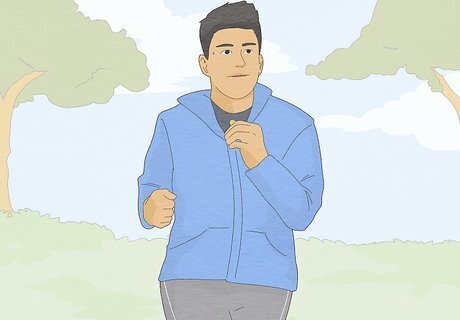
Exercise is a big mood and energy booster. Start by walking for at least 15 minutes a day. Try to build up your physical activity levels over weeks or months until you’re doing 2.5 hours of moderate-intensity aerobic exercise a week. Moderate-intensity aerobic activities you can do include brisk walking, cycling, and swimming. Yoga is another good exercise you can try to boost your energy levels.
Spend time with positive people.

The company you keep can affect your energy. Hang out with positive people who motivate and excite you whenever possible. Limit the amount of time you spend around negative people who drain your energy. Find people you can relate to and who have similar interests to spend time with. For example, if you like to hike, you could join or form a hiking club. Stay away from people who make poor choices or constantly complain.
Do stress-relieving activities to relax.
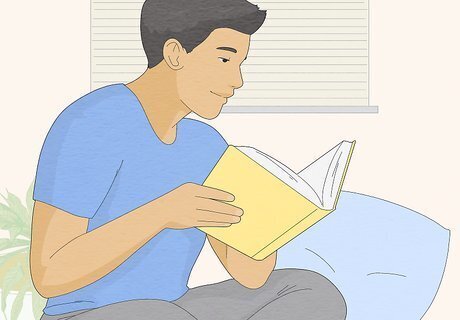
Stress consumes a huge amount of energy. Do things that make you relax like listening to music or reading. Try to let go of all your stress while you do these types of activities to conserve your energy. If you have major stress in your life, consider seeing a therapist or joining a support group. Or, try talking through your emotions with a friend or a relative. If you’re stressed out because of feeling overworked, ask for more help from co-workers to lighten your load. It’s okay to say no to social invitations in order to give yourself some time to relax on your own. Trying to squeeze in every professional, family, and social obligation and activity can be exhausting!
Limit your alcohol consumption.
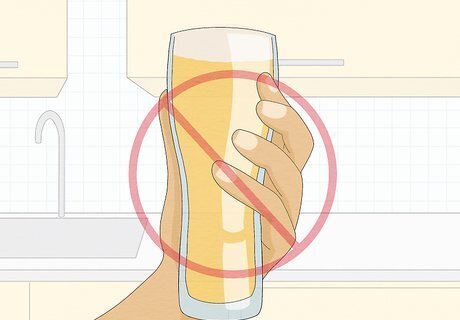
Alcohol has a sedative effect and drags your energy levels down. Avoid drinking alcohol at lunch to prevent an afternoon slump. Skip that 5 o’clock cocktail if you want to have more energy in the evening. Alcohol also dehydrates you, which is another cause of low energy levels. Avoid drinking before bed in order to get a good night’s sleep. If you want to have some drinks at dinner or in the evening, stop drinking 3 hours before bed and switch to water.
Do something you enjoy every day.
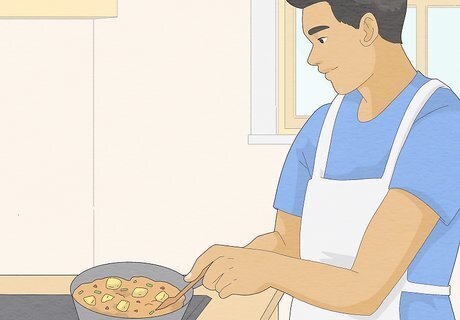
This helps you use and reserve your energy in a meaningful way. Make time to do something that you feel passionate about or practice a special talent you have every day. Try to have fun and give yourself this time to stop worrying about other commitments and pressures. This doesn’t have to be something big or complicated. It can be as simple as cooking a nice meal or dancing around your living room. If you can’t think of something you’re passionate about to do, try something new! A new activity or hobby can really rejuvenate your energy levels. For example, start learning Spanish or take up skateboarding.


















Comments
0 comment